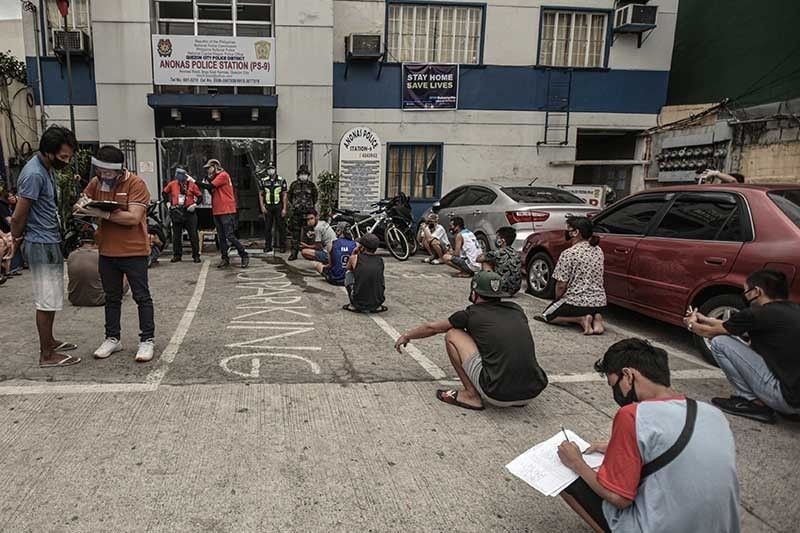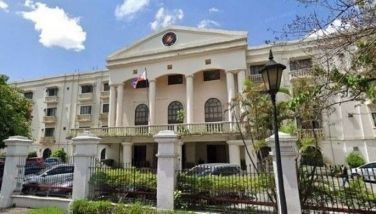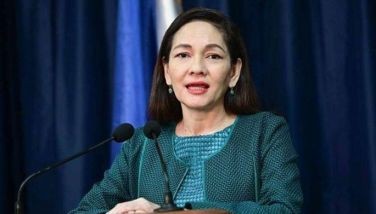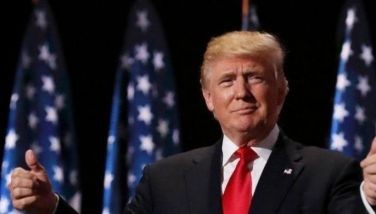UN experts: Drastic measures vs virus spread no reason for excessive use of force

MANILA, Philippines — United Nations human rights experts called on governments across the globe not to use state of emergency measures enforced to curb the rising number of coronavirus infections as an excuse to resort to excessive use of force.
The UN experts—which include special rapporteur on extrajudicial executions Agnes Callamard—made the statements as governments around the world impose drastic measures such as lockdowns to arrest the spread of the coronavirus pandemic.
In the Philippines, its main island of Luzon—home to about half of the country’s population—is entering its fifth week of enhanced community quarantine that is expected to last at least until the end of April. Since the declaration, there has been a heightened presence of uniformed personnel to implement strict quarantine measures.
“Even during states of emergency, the use of force remains guided by the principles of legality, necessity, proportionality and precaution. They demand that the use of force and of firearms must be avoided and that all possible non-violent means must be exhausted before resorting to violent ones,” the UN experts said in a statement Friday.
Current measures include restriction on non-essential movements and a curfew from 8 p.m. to 5 a.m. Those found violating quarantine rules have been arrested, ordered to do physical exercises and in a case in Santa Cruz town in Laguna, placed inside a dog cage.
At least 108,000 violators of quarantine protocols in the Philippines were arrested as of April 13.
“Breaking a curfew or any restriction on freedom of movement cannot justify resorting to excessive use of force by the police; under no circumstances should it lead to the use of lethal force,” the UN experts said.
‘Other ways to police than force first’
The UN human rights experts stressed that people living in poverty, homeless persons, minorities, people deprived of liberty and victims of domestic abuse—all who are already affected disproportionately by the virus—should not be victimized further because of violent emergency measures.
They urged law enforcement agencies to take into account the needs and vulnerabilities of particular groups of people and exercise caution when resorting to use of force.
“You can’t stay home if you don’t have one. You can’t remain confined if you don’t have what you need to your family. How do you ‘physically distance’ in an urban slum? How do you eat or drink when you are a daily-wage laborer and need to go out every day to earn the money to do so,” the experts said.
“For millions of people, emergency measures can be a more direct threat to their life, livelihood and dignity that even the virus itself. There are other ways to police than force first,” they added.
The chief Philippine National Police on Monday said cops would directly apprehend quarantine violators should President Rodrigo Duterte’s earlier pronouncement of a “martial law”-like community quarantine becomes a formal directive.
The novel coronavirus has so far infected 6,259 people in the Philippines, including 572 recoveries and 409 deaths.
The worldwide death toll from the pandemic reached 164,016 as of Monday, according to a tally from Agence France-Presse. More than 2 million cases have been recorded in 193 countries and territories since the new pathogen first emerged in China in December.
Of these cases, at least 525,200 are now considered recovered. — with AFP
If you believe you have come into possible contact with infected patients, you may be directed to the proper office of the Department of Health for advice through the following lines: (632) 8651-7800 local 1149/1150 or (632) 165-364. You may also opt to call the Research Institute for Tropical Medicine at (02) 8807-2631/ 8807-2632/ 8807-2637. The general public has also been encouraged to forward its concerns to the Health Department's dedicated 24/7 COVID-19 hotlines (02) 894-COVID and 1555 (free for all subscribers).
Follow this page for updates on a mysterious pneumonia outbreak that has struck dozens of people in China.
New Zealand Prime Minister Chris Hipkins says on Sunday that he had contracted COVID-19, testing positive at a key point in his flailing campaign for re-election.
Hipkins saYS on his official social media feed that he would need to isolate for up to five days -- less than two weeks before his country's general election.
The leader of the centre-left Labour Party said he started to experience cold symptoms on Saturday and had cancelled most of his weekend engagements. — AFP
The World Health Organization and US health authorities say Friday they are closely monitoring a new variant of COVID-19, although the potential impact of BA.2.86 is currently unknown.
The WHO classified the new variant as one under surveillance "due to the large number (more than 30) of spike gene mutations it carries", it wrote in a bulletin about the pandemic late Thursday.
So far, the variant has only been detected in Israel, Denmark and the United States. — AFP
The World Health Organization says on Friday that the number of new COVID-19 cases reported worldwide rose by 80% in the last month, days after designating a new "variant of interest".
The WHO declared in May that Covid is no longer a global health emergency, but has warned that the virus will continue to circulate and mutate, causing occasional spikes in infections, hospitalisations and deaths.
In its weekly update, the UN agency said that nations reported nearly 1.5 million new cases from July 10 to August 6, an 80% increase compared to the previous 28 days. — AFP
The head of US intelligence says that there was no evidence that the COVID-19 virus was created in the Chinese government's Wuhan research lab.
In a declassified report, the Office of the Director of National Intelligence (ODNI) says they had no information backing recent claims that three scientists at the lab were some of the very first infected with COVID-19 and may have created the virus themselves.
Drawing on intelligence collected by various member agencies of the US intelligence community (IC), the ODNI report says some scientists at the Wuhan lab had done genetic engineering of coronaviruses similar to COVID-19. — AFP
Boris Johnson deliberately misled MPs over Covid lockdown-breaking parties in Downing Street when he was prime minister, a UK parliament committee ruled on Thursday.
The cross-party Privileges Committee said Johnson, 58, would have been suspended as an MP for 90 days for "repeated contempts (of parliament) and for seeking to undermine the parliamentary process".
But he avoided any formal sanction by his peers in the House of Commons by resigning as an MP last week.
In his resignation statement last Friday, Johnson pre-empted publication of the committee's conclusions, claiming a political stitch-up, even though the body has a majority from his own party.
He was unrepentant again on Thursday, accusing the committee of being "anti-democratic... to bring about what is intended to be the final knife-thrust in a protracted political assassination".
Calling it "beneath contempt", he said it was "for the people of this to decide who sits in parliament, not Harriet Harman", the veteran opposition Labour MP who chaired the seven-person committee. — AFP
- Latest
- Trending
































